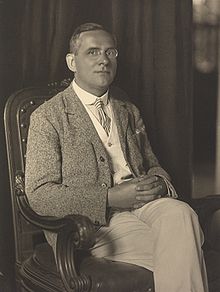Vienna circle
The Vienna Circle (German: Wiener Kreis) was a scientific and philosophical body formed in 1921 by the Austrian philosopher Moritz Schlick in Vienna, Austria, and dissolved definitively in 1936. This movement, known by the original name of the Vienna Circle for the Scientific World Conception, was mainly concerned with the logic of science, considering philosophy as a discipline in charge of distinguishing between what is science and what is not, and of the elaboration of a common language to all sciences.
The philosophical position of the Vienna Circle was called logical empiricism, logical positivism, or neopositivism. The main topics were founding debates in natural and social sciences, logic and mathematics; the modernization of empiricism by modern logic; the search for an empiricist criterion of meaning; the critique of metaphysics and the unification of the sciences in the unity of science. He stood out for his radically anti-metaphysical position and his logical conception of mathematics. He organized the first international congress on epistemology in Prague in 1929 and founded the journal Knowledge (Erkenntnis) in 1930. Today the Vienna Circle no longer represents a program of active research, but strongly influenced the development of analytic philosophy and the recent history of philosophy of science.
History
The members of the Vienna circle published their programmatic manifesto in 1929, in a booklet entitled The scientific vision of the world. They proposed using a common language that should be elaborated by philosophy, based on the language of physics, since this is the scientific discipline with the greatest advances and the one practiced professionally by many of the members of the circle. For the Vienna Circle, philosophy has the meaning of a discipline rather linked to logic and English empiricism, which defines the relevance of the statements. Ludwig Wittgenstein's 1922 publication of his Tractatus logico-philosophicus , influenced the work of the Circle and reaffirmed previous positions regarding treating science as a set of meaningful and relevant propositions..
The Vienna Circle project began to spread from the work of the magazine Knowledge directed by Rudolf Carnap, in which the main contributions of this movement were published. Karl Popper gave a presentation of his work The Logic of Scientific Research which had an important influence on the Circle. Although he identified with certain premises that are in falsificationism, he never later considered or associated with the Circle as a critic of its positivism.
The Vienna Circle dissolved as a result of political pressure and the rise of Nazism in Austria. In 1936, Moritz Schlick was assassinated by a Nazi student, Johann Nelböck, a situation justified by the German press of the time. After these events, most of the members of the Vienna Circle fled to other countries (mainly the United States), where they continued to develop their philosophy: logical positivism, but no longer as a circle, but in a disseminated way.
In 1939, Rudolf Carnap, Otto Neurath, and Charles Morris published the International Encyclopedia of Unified Science. Although logical empiricism continued to develop for a time, this volume is considered the last work done by the Vienna Circle.
Philosophy
The philosophy of the Vienna Circle advocates a scientific conception of the world, defending the empiricism of David Hume, John Locke and Ernst Mach, the method of induction, the search for the unification of the language of science and the abolition of metaphysics in the scientific field. This philosophy is a form of empiricism and a form of positivism known by the names of logical positivism, neopositivism, logical empiricism, or neoempiricism, although members of the Vienna Circle preferred to call it consistent empiricism.
Positivism and logical empiricism or neoempiricism did not require any distinction, since they had objective criteria with which to respond: the principles of verification and confirmation respectively. However, as soon as knowledge is identified with proven or confirmed knowledge, to a certain degree the pitfall of having to justify inductivism as a legitimizing doctrine of inferences arises. Instrumentalist conceptions, which base acceptability on utilitarian criteria, are free from this stumbling block.
Members of the Vienna Circle
- Moritz Schlick
- Rudolf Carnap
- Otto Neurath
- Olga Hahn-Neurath
- Herbert Feigl
- Philipp Frank
- Friedrich Waismann
- Hans Hahn
- Hans Reichenbach
- Kurt Gödel
- A. J. Yesterday
- Charles Morris
- Felix Kaufmann
- Victor Kraft
- Otto Weininger
- Carl Hempel
- Rose Rand
Background
We can consider the following authors as precursors of the Vienna Circle.
- Auguste Comte
- Gottlob Frege
- John Locke
- David Hume
- Ernst Mach
- Bertrand Russell
- Ludwig Wittgenstein
- Hans Kelsen
- Descartes
Contenido relacionado
Template:EL
Erich Fromm
Profession
